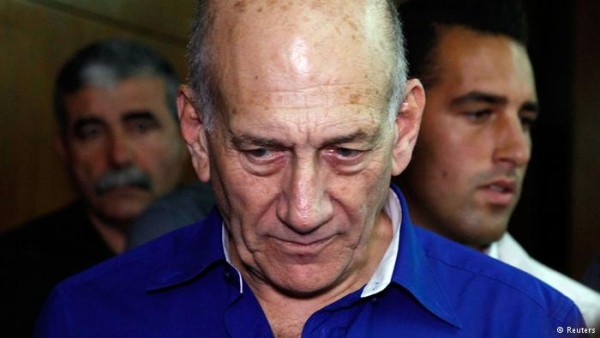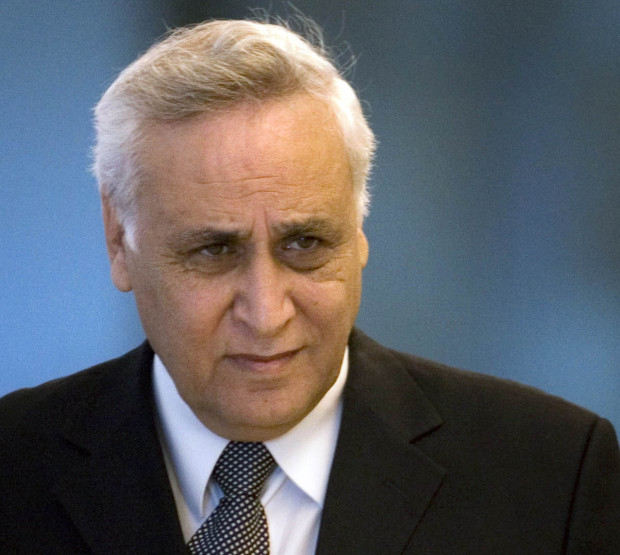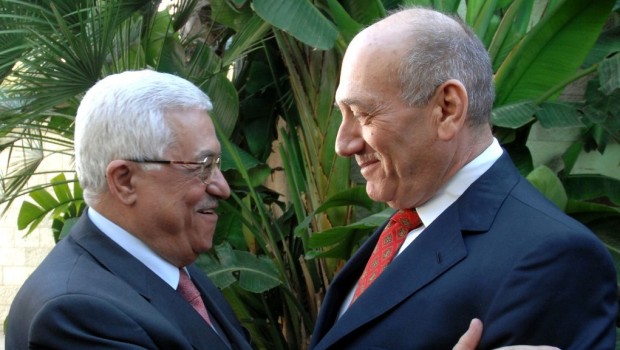It was indeed a “sad day” for Israel, as Ehud Olmert himself murmured after a judge in Tel Aviv’s district court sentenced him to six years imprisonment on charges of corruption. Olmert now has the dubious distinction of being the first former Israeli prime minister to be saddled with the indignity of a criminal record.

The Olmert case is symptomatic of the malaise that grips Israel.
In its 66th year of statehood, Israel has morphed into a “normal,” materialistic country, with all its glaring and disappointing imperfections. The Zionist pioneers dreamed of establishing a nation like all others, and in many respects this is what Israel has become in the past six decades as it has shed its lofty ideals and principles.
As the Organization for Economic Cooperation and Development put it in a report a few years ago, Israeli political institutions are among the world’s most corrupt.
Olmert, of course, is not the first Israeli politician to have disgraced himself and his country.

Moshe Katsav, forced to resign as president, was convicted of rape and obstruction of justice and jailed for seven years. Avraham Hirschson, the former finance minister, is currently serving a sentence of five years after having been found guilty of, among other crimes, breach of trust, fraud, theft and money laundering.
Aryeh Deri, a former interior minister and a leading light in the Sephardi community, spent 22 months in prison for having accepted bribes. Shlomo Benizri, another cabinet minister, languished in jail for 18 months after being convicted of bribery. Tzachi Hanegbi, a justice minister, was acquitted of bribery but charged with perjury.

In 1977, Yitzhak Rabin, in his first term as prime minister, was forced to resign after it was discovered that his wife, Leah, had an illegal bank account in the United States.
More than a decade ago, Benjamin Netanyahu, the then opposition leader, successfully battled corruption charges. Shortly before he was hospitalized, Ariel Sharon, the prime minister, faced similar charges. And lest we forget, Foreign Minister Avigdor Liberman was compelled to step aside temporarily after being accused of corruption.
And now this.
Olmert, 68, might have been a better-than-average prime minister if not for fatal character flaws. He was smart, engaged and willing to adapt his views to changing circumstances. Yet he was arrogant, greedy and foolish. And in typical Israeli style, he was a consummate corner cutter with a sense of entitlement who assumed he was above the law.
First elected to the Knesset at the tender age of 28, Olmert was a wunder kind, serving as a cabinet minister before his election as mayor of Jerusalem. It was during this period of his career that he succumbed to temptation and reportedly accepted bribes from the builder of the Holyland housing project in southern Jerusalem.

Returning to national politics, Olmert became one of Sharon`s confidants, supporting his plan for a unilateral withdrawal from the Gaza Strip, an albatross around Israel`s neck. By this point, Olmert was no longer an ideological right-winger, having realized that Israel`s future as a democratic Jewish state was imperilled by its presence in the occupied territories.
The pullout from Gaza in 2005 shook up Israeli politics, prompting its advocates to bolt the Likud Party and form the centrist Kadima Party. Sharon and Olmert were the chief architects of this political earthquake.
Succeeding Sharon as prime minister in 2006, Olmert took a series of bold steps to assert his leadership.
Six months after taking office, he initiated a three-week war with Hezbollah after its operatives kidnapped two Israeli soldiers and killed several others in a brazen attack inside sovereign Israeli territory. Olmert’s disproportionate response was questionable, as were Israel’s tactics in repelling the aggressors, but at the end of the day Israel managed to deter Hezbollah.
Olmert’s most important achievement was on the Palestinian front.
In 2007, within the framework of the U.S.-sponsored Annapolis process, Israel revived direct negotiations with the Palestinian Authority in an attempt to hammer out a peace treaty. Olmert and his Palestinian counterpart, Mahmoud Abbas, discussed the core issues and almost reached an historic agreement.

By all accounts, Olmert was ready to make sweeping and unprecedented territorial concessions in exchange for a genuine peace accord. He had come a long way from his days as a finger-wagging Likud rejectionist. But by then, he was already a lame duck by virtue of the whiff of corruption that finally forced him to resign in 2009.
With a little courage and fortitude, Abbas could have responded to Olmert’s generous offer, but chose instead to remain silent. As far as Abbas was concerned, Olmert was a dead duck politically. And he was right.
Olmert made his mark on the military landscape of the Middle East by bombing Syria’s secretly-built North Korean nuclear reactor in 2007 and by invading Gaza in 2009. The Syrian raid was a contribution, however unorthodox, to the cause of nuclear non-proliferation. The incursion into Gaza, while deterring Hamas to a large extent, turned out to be a public relations nightmare.
In retrospect, Olmert was a politician who did not bask in the complacent comfort of the status quo, like two of his predecessors, Yitzhak Shamir and Netanyahu. He was a man of action who was open to change and fearless in confronting challenges that impinged on Israel’s security.
Unfortunately, he was morally tainted, as David Rozen, the judge who handed down Olmert’s sentence on April 13, observed in a scathing commentary. Likening a bribe taker to a traitor, Rozen declared that Olmert had betrayed the trust with which he had been entrusted. “Without trust, there can be no upstanding public service,” he said.

Rozen’s verdict is commendable on three counts.
It proves, once again, that Israel’s judicial system is independent and not beholden to outside interests. It strengthens the pillars of Israeli democracy. And it sends a powerful and unmistakable message to wrong doers plotting to enrich themselves at the public’s expense.
